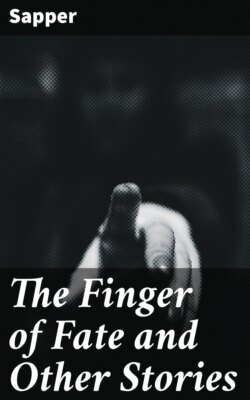Читать книгу The Finger of Fate and Other Stories - Sapper - Страница 11
На сайте Литреса книга снята с продажи.
§ IV
ОглавлениеTable of Contents
"HAS it ever occurred to you, Mercer, that by far the best way of stopping people talking about a thing, is to present them with a ready-made solution which accounts for that thing? If in addition that solution can be substantiated by an unbiassed witness its value is greatly increased."
Trent had gone in the custody of Inspector Simpson, and Tennant and I and the girl—little the worse now for her rough handling—were sitting in my study.
"There is nothing so fatal," he continued calmly, "to arriving at the truth as to start with a preconceived theory. And a ready-made solution in nine cases out of ten causes just such a start. If a man is perfectly satisfied with his solution he has no incentive to try and find another.
"The preconceived theory in this case was that Jack had met his death accidentally. I was perfectly prepared to believe it: at the same time I was equally prepared to disbelieve it. And when I arrived here, I endeavoured to make my mind a blank except for three facts, none of which were conclusive and all of which were perfectly consistent with the accident theory.
"The first was that it was strange that Jack should have been standing so near the edge. Not impossible—but strange.
"The second was that it was Laurence Trent who found him.
"And the third was—that if it wasn't an accident—Trent is, as far as I know, the only man who had any motive for killing Jack—namely Mary."
That was my state of mind when I first saw Trent. I had no proof whatever that it wasn't an accident: but I had no proof that it was. And then I noticed the button. To you it conveyed nothing: to me it was a most significant thing. To a man who was in the condition of agitation that he was in to set to work to sew a button on his coat struck me as most peculiar. Unless he was afraid of such a thing as finger-marks: unless, perhaps—it was still only perhaps—there had been a struggle, a button had been wrenched off his coat, and he had decided to sew it on to prevent questions.
"Then you started the black monk question. Well, Mercer, I frankly admit I'm sceptical. But I am old enough now to realise that just because I don't happen to believe in a thing, that that is no proof of its falseness. Men of brains, men of intellect have assured me that they have indisputable proof that spirit photographs have been taken. And when Trent showed me his copy I was still prepared to believe in the possibility of its being genuine. Until you showed me yours. Did you ever see the two prints side by side?"
"Never," I said.
"And Trent never intended that anyone should. It was his one great mistake. In your copy the outstretched arm of the black monk just reached a corner of the priory behind it: in his copy there was at least the sixteenth of an inch overlap. Which proved instantly that it was merely an ordinary fake done by superimposing one film on another. It also proved instantly that we were dealing with a singularly dangerous man—and a singularly clever one."
"For the life of me I don't quite see the object," I said.
"You go to the theatre, don't you, Mercer? And you know the effect of concentrating the limelight on one figure. The audience doesn't worry about the others. Now if you were to walk into any public house within a radius of five miles at this moment, you would find that the black monk is the sole topic of conversation. The sceptical ones will say it's coincidence, and the superstitious that it's fate. But it would have served its purpose with both parties—and that was to occupy the front of the stage leaving the rest in darkness.
"You were there to give an air of truth to the whole thing. Why—you believed it yourself: you vouched for his agitation when he took the photo."
"I can hardly believe that the man had planned the whole thing then," I said. "It seems too monstrous."
Tennant shrugged his shoulders.
"Who knows? Perhaps it was a whim of the moment: perhaps he really did think some trick of the light was the black monk. And then the idea grew until it obsessed him. He was committed to nothing: all he had to do was to wait his chance. But the point is that when I left with you in the car I knew Trent had murdered Jack. Which is a totally different thing to proving it. He had destroyed the main evidence by tipping the ink over it: and even if the police arrested him—which was most unlikely—there wasn't a hope of his being convicted on the evidence I had."
He mixed himself a drink.
"Theatrical, perhaps. And yet I don't know. On the face of it it seemed so theatrical that it must be true. Wherein lay his cleverness. However Monica proved to-night that other people could act too."
And then came the strangest thing of that strange night.
"I suppose you realise, Peter, don't you," she said quietly, "that I was completely off?"
He stared at her blankly.
"You were what?" he stammered. "You say you were—off. Good God!"
